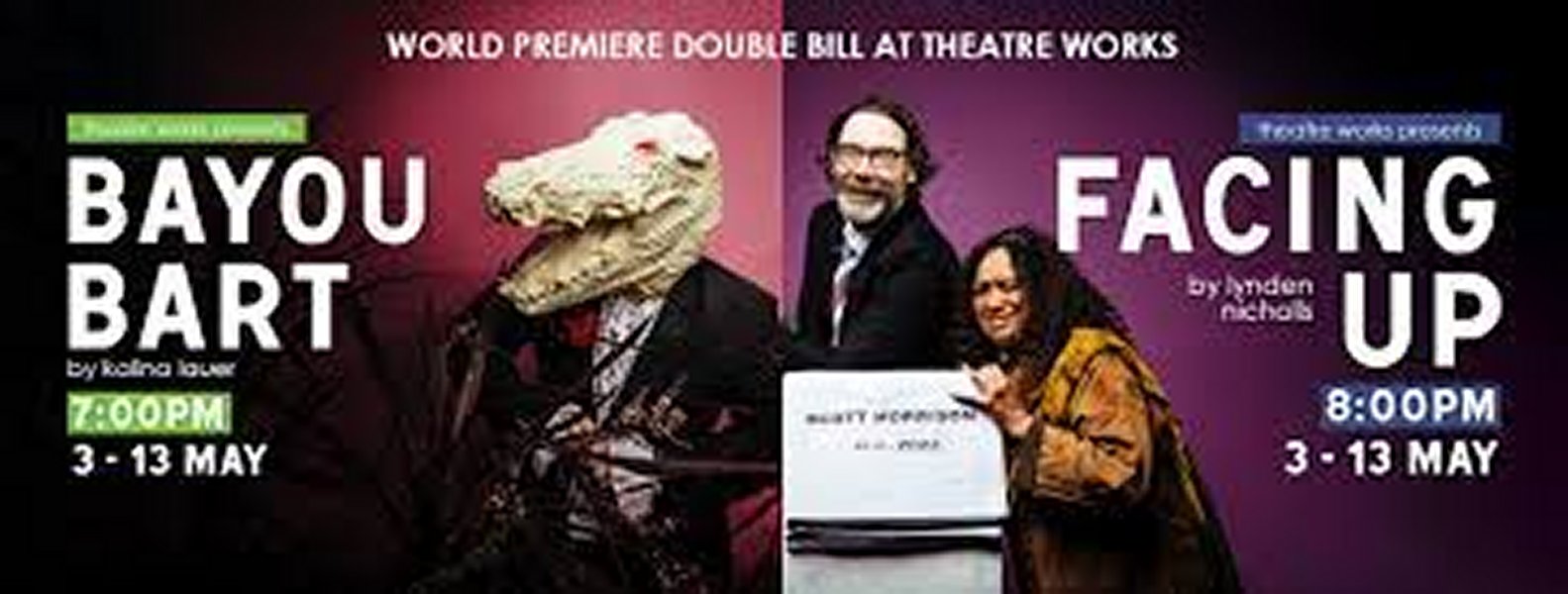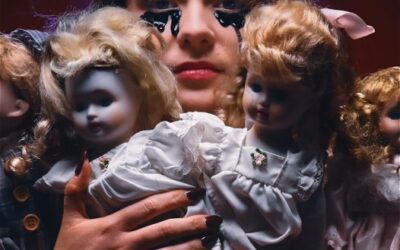By Ellis Koch
With my reviews I try my best to not review content, or at least only review it in vague summary. In part this is because I don’t want to be the type of reviewer who gives you a breakdown of the plot and characters – I’m reviewing a production, not a plotline. I also don’t want to spoil anything in case you, the reader, decides to see the production for yourself. Mainly, though, a good review will keep away from discussing content because the enjoyment of content is subjective rather than objective. I don’t have to enjoy or agree with the content of a play to discuss and critique the technical aspects or whether the production is, from the perspective of form, successful or not. Content is not form. Content is subjective and is not really held to a list of parameters for assessment. Form and technique, however, can be held to an objective standard. So, with regard to Lynden Nicholls’ latest production, Facing Up, and everything I have just said: The content, which deals with government policy on Indigenous Australians throughout the past 120 years of our history, is important on a cultural and political level for everybody to hear and understand but the production itself fails to create an engaging or challenging piece of theatre out of the material it presents. The content matters outside of my review but for the sake of my review, it does not matter. The play could have been about any other thing and my thoughts would be the same – objectively the production was weak, unengaging and did little to grab my attention.
The presentation of the material was simplistic and much of the action was largely symbolic, consisting of one man (Shannon Nicholls) playing every Australian Prime Minister from Barton on up (with the glaringly notable exception of Julia Gillard) and reciting their recorded policy, verbatim from what I could tell, on Indigenous affairs. Prenc mostly delivered his lines from behind a lectern with an exception here or there. I liked Nicholls – he worked with ultra-dry material yet managed to bring enough minor changes here and there to his rather deliberately staid performance to keep it as interesting as he could. As each Prime Minister rolled by his delivery didn’t change much but there were clear, though small, differences in each of them. I can only applaud this as his lines solely consisted of actual political speeches lifted directly from the history books and left very little room for any real performance. In between Nicholls reciting the political policies of each prime minister two women (Zerene Jaadwa and Trudy Fatnowna Edgeley) create piles of sand across the stage and take turns in commenting on the policy just spoken – this dialogue reflects the anger and the hurt and the damage that has been wrought by such policy for over one hundred years. They are the voices of the angry, the disaffected, the mistreated, and the robbed. They are the voices of our Indigenous Australians. Jaadwa, like Nicholls, performs her material well – she delivers her lines with thought and connection to the material to create nuanced delivery and she has more to work with than Nicholls does with regard to emotive material. Clearly both she and Nicholls are skilled performers who understand the craft of acting and they make the material somewhat bearable. Any flaws with the production or the script have no bearing on them whatsoever. Unfortunately Edgeley however, is outside of the league of Nicholls and Jaadwa with regards to performance. Her deliveries are wooden, carry a strange cadence and she spent much of her time looking at Jaadwa for what appeared to be approval or perhaps confirmation that she was saying the right words . . . I’m not sure but it was not a performance of the same standard as her counterparts. It takes a lot of guts to get up before a crowd of people and do what actors do so I commend Edgeley on getting out there and just getting through the material but I feel as though she has a long way to go with regard to her acting journey. The best education an actor can receive, however, is just getting out there and performing so I hope that, rather than take anything I say in a negative fashion, she keeps treading the boards and gaining experience.
The main issue with Facing Up is that there is little imagination with regard to the script or direction. I appreciate that the subject matter is deeply serious but this doesn’t mean that it can’t be tackled on stage in an engaging way. It’s basically forty five minutes of people talking at the audience, never addressing each other or barely acknowledging each other for that matter. The opportunity to craft an interesting dialogue between First Nations people and the prime ministers of the past is passed up to instead present information and this information isn’t engaging in its presentation- it’s just verbalised. It’s interesting insofar as history itself is interesting by the virtue of being our history … but there is no drama here. There is no interplay between the people on stage. There are no stakes. There is just … information. It is more presentation than theatre, like a documentary and a series of interviews. In the writing of Facing Up writer/director Lynden Nicholls has left out any element of plot or character and the whole piece feels more like a collection of isolated moments from conversations with First Nations people … and nothing happens. In some sense this could be a metaphor for the lack of progression regarding Indigenous affairs … if only it were deliberately written to be like that but Facing Up is the driest of dry writing and this is a terrible way to engage broader audiences in important issues. It’s the sort of writing one might read in a textbook and, as if it couldn’t get any drier, Nicholls’ direction feels static and stale. There is no lighting and no sound and little use of any theatrical convention whatsoever. Even the house lights were left on above the audience. There is a set – a backdrop of Indigenous art and a similar piece that makes up the floor the actors stand on. There are bags of sand and a lectern that gets wheeled in. I admit, I love a simple set and I don’t have a problem with this simplicity – but with regard to Nicholls’ direction of her own material it’s almost as if the idea of the stage is just a platform with which to speak from . . . and maybe it is, if we are to strip away all of the other elements that go into theatre. But that’s the point – I don’t feel as though I was watching theatre. I feel as though I was watching a presentation. Theatre should be engaging. It should use its elements in a clever way to accentuate and further the story it is presenting. It is not enough, in my opinion, to just say words on a stage and call it theatre. There IS a repetitive action present that acts as symbolism, I’ll give the piece that. And there is dialogue, no matter how dry it is. There’s no tension or atmosphere though, there’s not really character. There is no conflict, no resolution. It is words on a stage.
Are those words important? Yes. I just wish they had been woven into a riveting piece of theatre rather than a flavourless presentation that begs the question – Is it even theatre? Well, it has some elements of theatre contained within but these are relatively light and, as such, I would somewhat begrudgingly call it theatre. I just wouldn’t call it good theatre.
Facing Up is a forty five minute presentation of culturally and politically significant information that could have been so much more.





